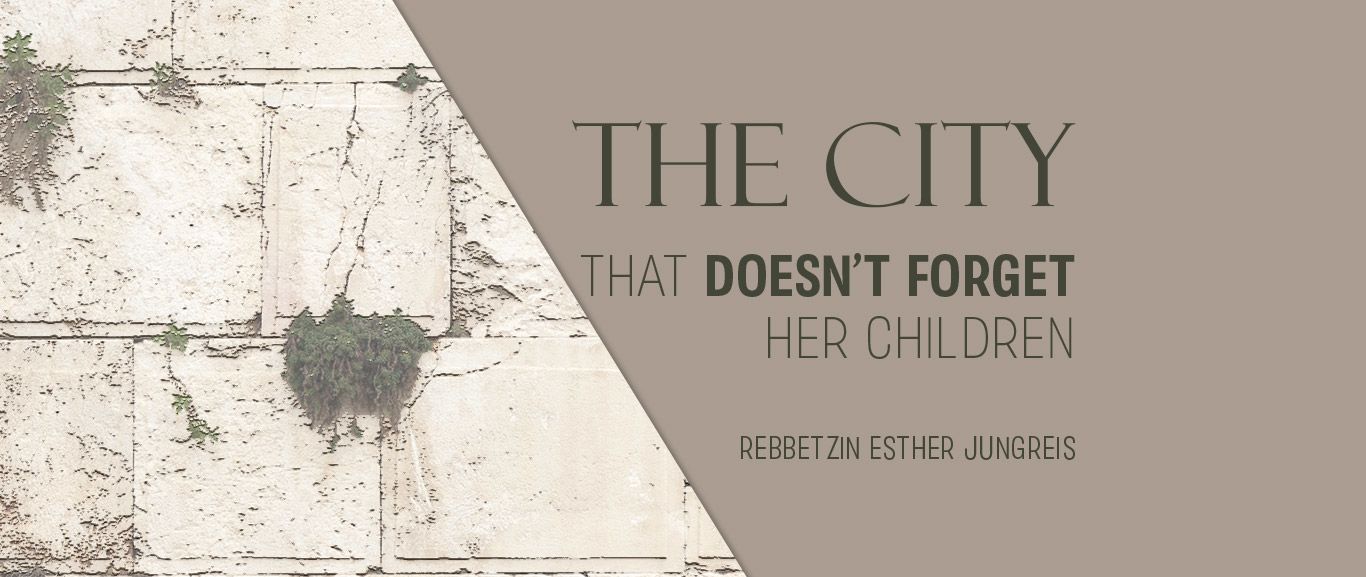
The City That Doesn’t Forget Her Children
28-Iyar: Yom Yerushalayim: I put my hand on the stones but the tears that flowed were not mine. They were the tears of all Israel, tears that scorched and burned the heavy gray stone. A MUST READ!!

Of all the Arab armies, Jordan’s Arab Legion was the best trained and fiercest. Moreover, the border with Jordan was the most difficult to defend, so it was no surprise that, when King Hussein’s army first attacked, the Israeli military was convinced that the shots were just tokens to accommodate Nasser, and that Hussein would not risk war. But Jordan kept pounding away, its artillery and bullets raining upon Jerusalem. Still, Israel requested the UN Truce Supervision Office to convey to Jordan assurances of peace. But it was all to no avail, and Israel had no choice but to open a second front. The Jordanians possessed hundreds of Patton tanks, and tens of thousands of Legionnaires, powerful warriors, equipped with the most sophisticated weapons, who were prepared to fight to the end. The battles were fierce and savage, made all the more complicated by orders given to Israeli paratroopers to avoid damaging the many sites in the Old City. Many brave young men were injured or lost their lives – the sacrifice was great, but so were the miracles.
The Holy City was not prepared for battle. There were hardly any bomb shelters to protect the civilian population. Shells fell and did not explode, and many that fell and did explode caused no injury. A shell landed on Shaarei Tzedek Hospital’s baby nursery. Fearing the worst, nurses rushed in to save the infants, but miraculously, they were all unharmed. A shell penetrated the roof of the Mirrer Yeshivah but did not explode. Over the centuries, Jerusalem was ravaged and sacked many times, but G-d made a promise that the Wall, the remnant of the Holy Temple, would stand eternally and bear witness to the homecoming of our people. And now, almost two thousand year later, the moment had come. I have read countless reports from journalists and soldiers who participated in the battle for Jerusalem, and all their stories had one focus – “the Wall”.
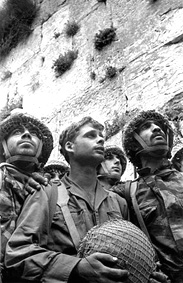 Moshe Amirav, a paratrooper, describes the first minutes at the Wall: “Forward! Forward! Hurriedly, we pushed our way through the Magreb Gate, and suddenly we stopped, thunderstruck. There it was, before our eyes! Gray and massive, silent, and restrained. The Western Wall!
Moshe Amirav, a paratrooper, describes the first minutes at the Wall: “Forward! Forward! Hurriedly, we pushed our way through the Magreb Gate, and suddenly we stopped, thunderstruck. There it was, before our eyes! Gray and massive, silent, and restrained. The Western Wall!
“Slowly, slowly, I began to approach the Wall in fear and trembling, like a pious cantor going to the lectern to lead the prayers. I approached it as the messenger of my father and my grandfather, of my great-grandfather and of all the generations in all the exiles who had never merited seeing it – and so they had sent me to represent them. Somebody recited the festive blessing, ‘Blessed are You, Oh L-rd our G-d, King of the Universe, Who has kept us alive and maintained us and brought us to this time.’ I put my hand on the stones and wept, but the tears that started to flow were not my tears. They were the tears of all Israel, tears of hope and prayer, tears of Hassidic tunes, tears of Jewish dances, tears that scorched and burned the heavy gray stone.”
And who can forget the photograph of our soldiers standing in awe – just looking up at the Wall? And who can forget the report of the IDF radio announcer: “…Suddenly, we recognized the familiar voice of the commander of the paratroops brigade, Colonel Mordechai ‘Motta’ Gur, giving orders to the battalion commanders to occupy the Old City: ‘Attention, all battalion commanders! We are sitting on the mountain range that looks down on the Old City, and are about to enter it. The Old City of Jerusalem that all generations have been dreaming about and striving toward. We will be the first to enter it.’
“With us on the roof,” the announcer continued, “was General Shlomo Goren, at that time, the Chief Rabbi of the Israeli Army. Rabbi Goren informed Gur over the walkie-talkie that he was on his way to meet him so as to be among the first to enter the Old City. As far as I remember, we were the only ones in the whole area running without helmets or weapons. Goren was armed only with a shofar and a prayer book and we carried only a tape recorder and a knapsack filled with batteries and rolls of recording tape.
“We ran, while trying to stay as close as we could to the Old City Wall to our right, but exposed to the sniper fire coming from the Mount of Olives on our left. As we ran, we passed two lines of paratroopers who were progressing carefully toward the Lions Gate. Goren was determined to get to the head of the line as quickly as possible. At the top of the street leading to the Lions Gate, we passed a still-smoking Jordanian bus. We stopped only at the Gate itself, which was blocked by an Israeli Sherman tank that had gotten stuck in the entrance. We climbed over the tank and entered into the Old City.
“Now the excitement reached its peak. Goren did not stop blowing the shofar and reciting prayers. His enthusiasm infected the soldiers, and from every direction came cries of ‘Amen!’”
The shofar was sounded in Jerusalem and its call reached Jewish hearts in the four corners of the world. The effect was magical. Our people because spiritually rejuvenated. Even those who had never believed, those who were hardened agnostics, felt something in their hearts. The Wall called them, and despite themselves, they felt a need to respond, to touch its stones, to place a note with a prayer in its crevices, to pour out their hearts and cry.
My husband and I made a decision. We knew that no matter what, we too had to be there, and so we took our four small children and traveled to Jerusalem. The city was congested with people – there wasn’t a hotel room to be had. For a moment, I panicked, but then my husband reminded me of the teaching of our Talmud: In Jerusalem, no one ever complained of discomfort, in the City of G-d, every man had a place, everyone was welcome.
It was Friday, Erev Shabbat, when we arrived, and there was no time to lose – the Sabbath Queen was quickly approaching and the entire city was readying herself for the arrival of the royal guest. Everywhere, stores were closing and public transportation was coming to a halt. As the siren was sounded, a stillness descended on the Holy City.
Suddenly, scores of people spilled into the streets. They came from every direction: young and old, men and women, Israelis and tourists, students and soldiers, pious Chassidim in long black coats and westernized Jews in business suits. They spoke in many tongues, espoused many ideas, and wondrously, they all merged into one. All of them were rushing, running to the same place, to the Wall.
We too, melted into the crowd. We didn’t know our way, but we followed the others. My heart beat faster and I clutched my children’s hands. I saw tears in my husband’s eyes. We were in Jerusalem.
We made our way through the dark alleyways. My son tugged at my sleeve. “Ima,” he asked, “how did our soldiers do it? How did they liberate the city? How did they get through these gates, these alleys?”
“Jerusalem’s time has come,” I answered, “and G-d Himself opened the gates.”
Then suddenly, without warning, the Wall was before us, more majestic than I could ever have imagined. We could not speak; there were only tears. For two thousand years we had waited for this moment. Our ancestors had prayed for this day. What would they not have given to stand here, even for a fleeting second, and yet they were denied the privilege. How strange that our generation, which was unworthy and wanting in faith, was the one to stand here in the presence of sanctity.
I looked up at the Heavens and searched for my grandfather. Surely the angels had gathered his ashes from Auschwitz and brought them as an offering to this very spot.
“Zeide, Zeide,” I cried into the night, “please walk with me, for here I cannot stand alone.”
All around us, people were praying and our voices became one with theirs. I poured out my soul. I looked up at the greenery sprouting from the crevices. Strange, I thought to myself, how these little branches grow without being watered. But then I saw the people around me and I understood from whence the branches received their nourishment. They were watered by the tears of a nations that had been waiting for two thousand years.
Walking back to our hotel we met a young soldier who had been among those who liberated Jerusalem. He told us about his best friend who had fallen on the Temple Mount on the very spot where once, long ago, the Alter had stood.
“I ran to my friend,” he told us. “I tried to help him, but it was too late. I broke down and wept, and as I cried, I heard an eerie sound. It was the braying of a donkey echoing in the night. The donkey actually seemed to sob with me, crying in pain as if imploring to be allowed to carry Messiah into the Holy City.”
Never before in the annals of mankind did a war last only six days.
Coincidence? Or was the seventh day begging to come? – The seventh day that is all Sabbath, the day that is Mashiach.
For a very brief moment, it appeared as if our people might just understand and be prepared to respond to this awesome challenge. But all too soon, the magic of the moment evaporated, and once again, we failed the test.
We reverted to our old ways – we congratulated ourselves on our success and came to take all those miracles for granted. Those of us who lived it have forgotten, and those were not yet born were never touched by it.
The fundamental law of Jewish survival stipulates that we cannot assimilate or become “like all the other nations of the world.” This law holds true not only in the countries of our exile, but in Israel as well. G-d did not bring us back to our ancient land so that we might become like all other nations and convert Jerusalem into New York, Parish, or London.
Just consider the tragedy that has befallen us. To live in the Land of the Patriarchs and yet spurn their legacy; to speak Hebrew impeccably, and yet not know how to pray; to live in the Land of G-d, and yet lack faith in Him.
We have failed the test.
But even if we failed the test, even if we forgot G-d, He does not forget us. His covenant and love are eternal and He will continue to call us. If we are blind to His miracles, He will find other ways to awaken us. So it is that since those heady days of the Six Day War, we have suffered many painful wake-up calls, but sadly, we have remained impervious to all. Nevertheless, G-d continues to call.
Many of us have heard the call, many are committed and live genuine Torah Jewish lives, but there are still so, so many who have yet to hear the call.
As we enter the final stages of our history, we have a choice – to stand straight and tall, to embrace with open arms and loving hearts our G-d-given covenant and sing His praise, or to continue to be blind and obdurate and delude ourselves into believing that we can live our lives without Him. But even as we stumble through the darkness, He will be holding our hand. He will not let go. He will not forget us. He will not forsake us. So let us return to Him with willing hearts, with love. Let us pass our test.
***
From “Life is a Test” by the author, rights are reserved for publishing “Bina”.


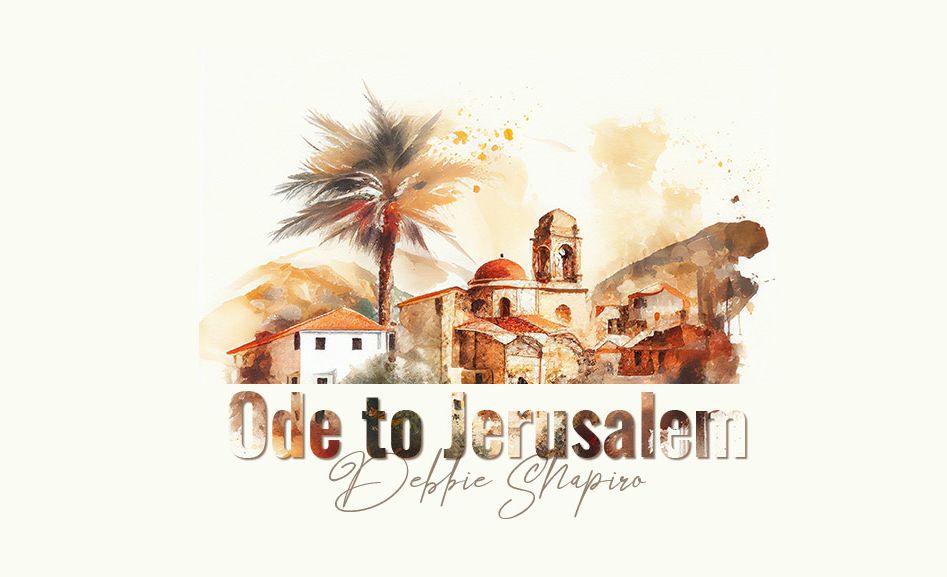

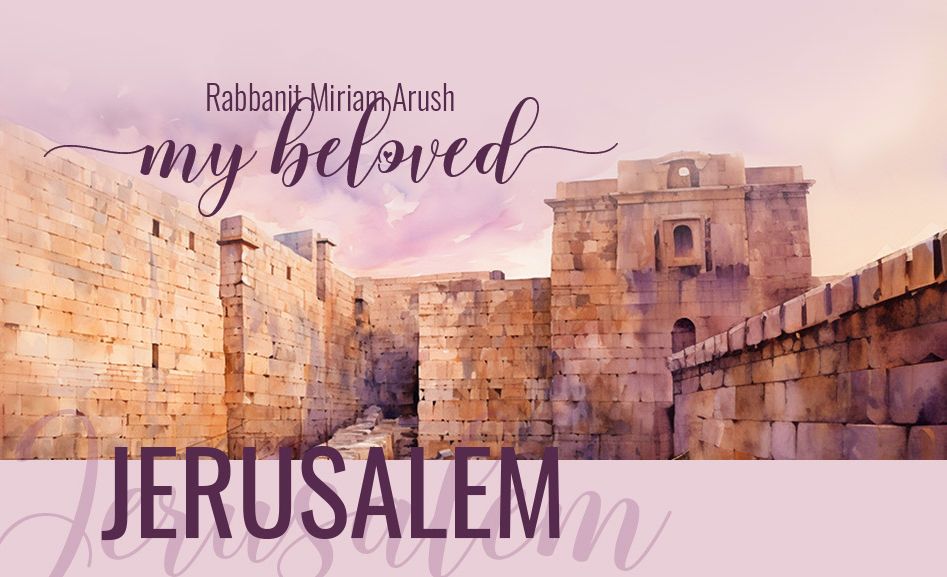
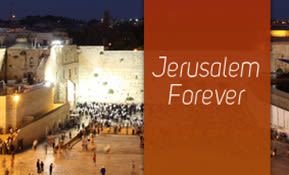

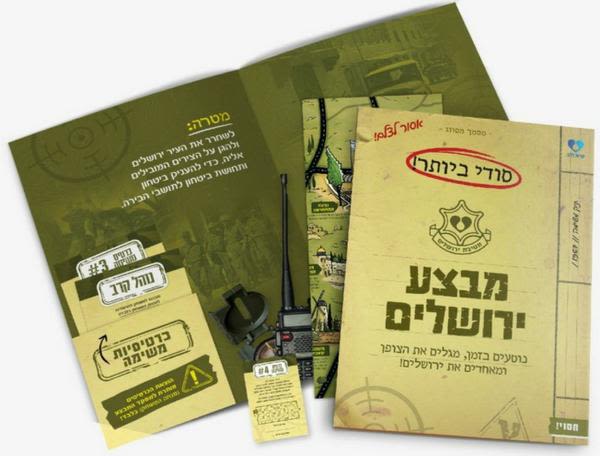
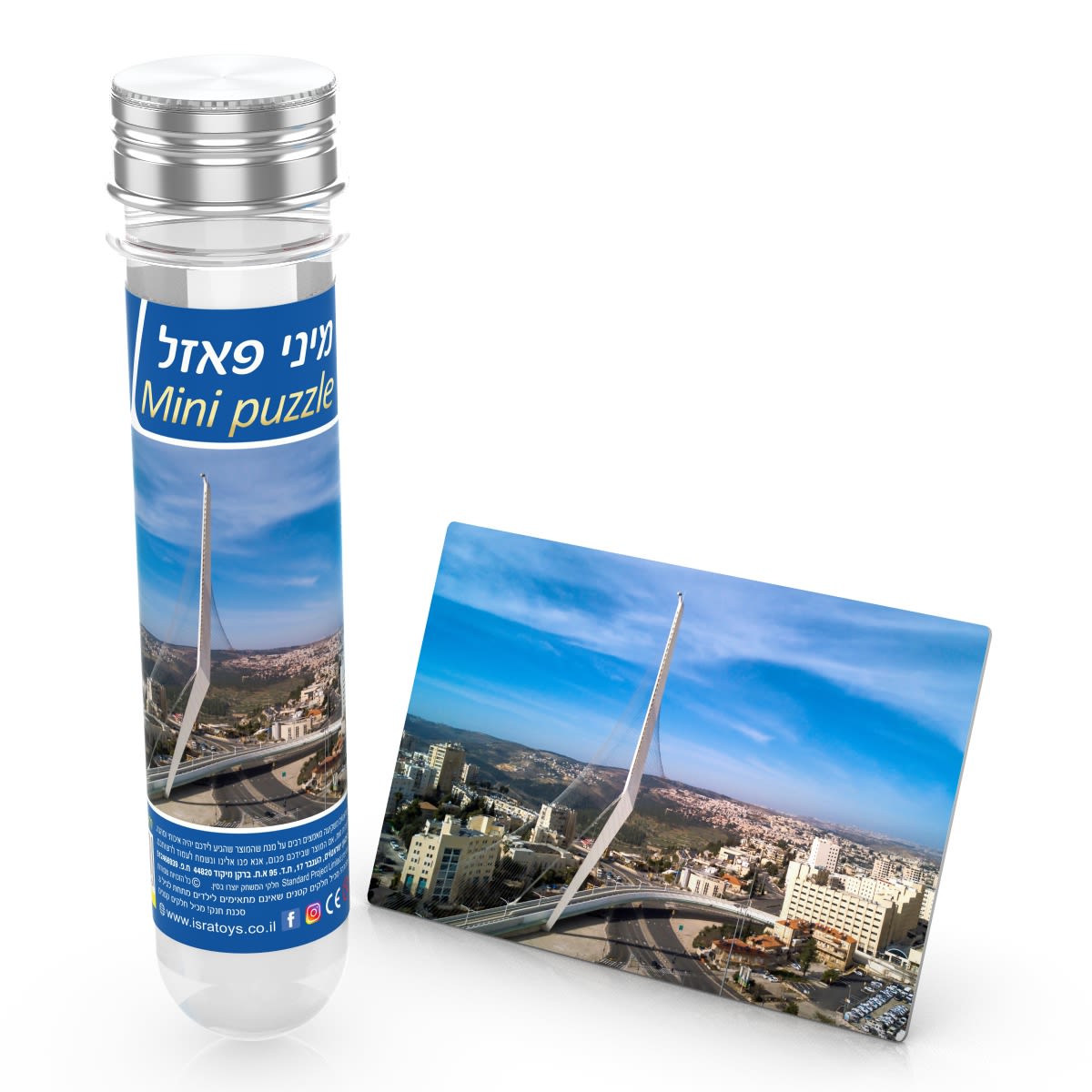
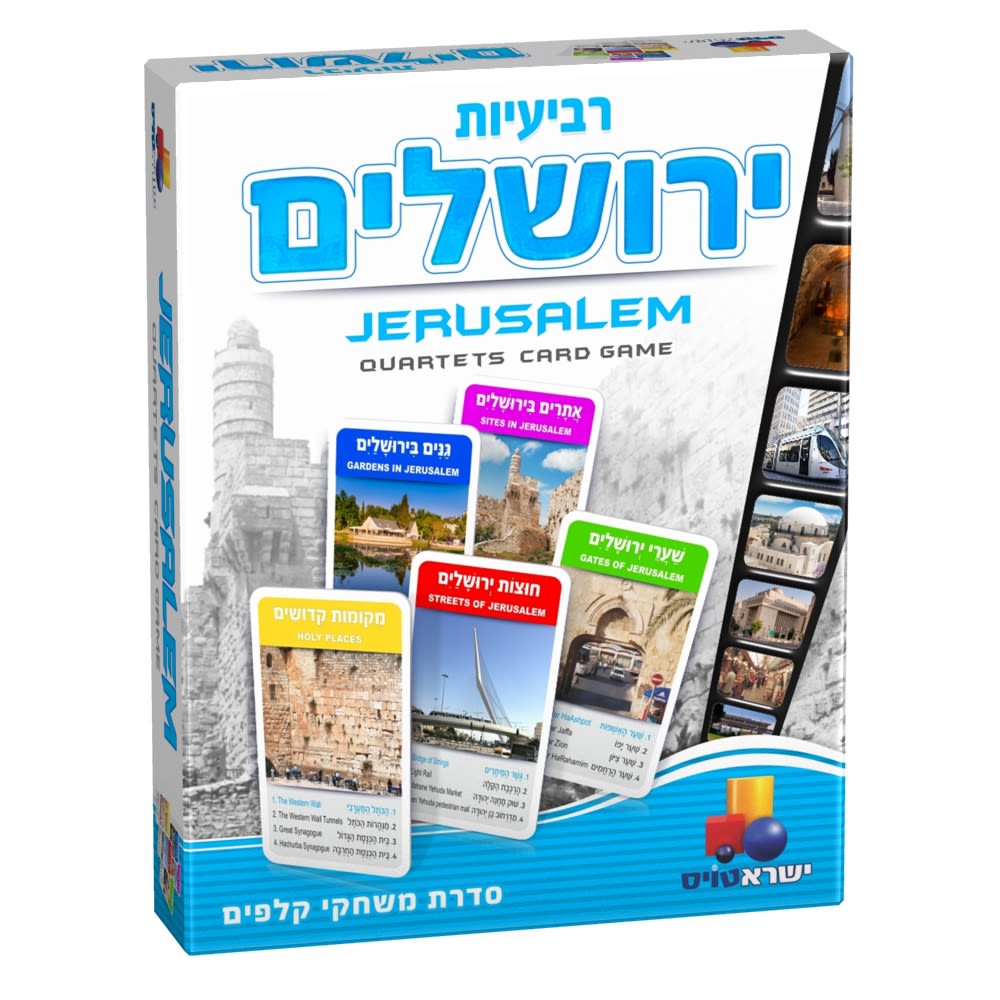
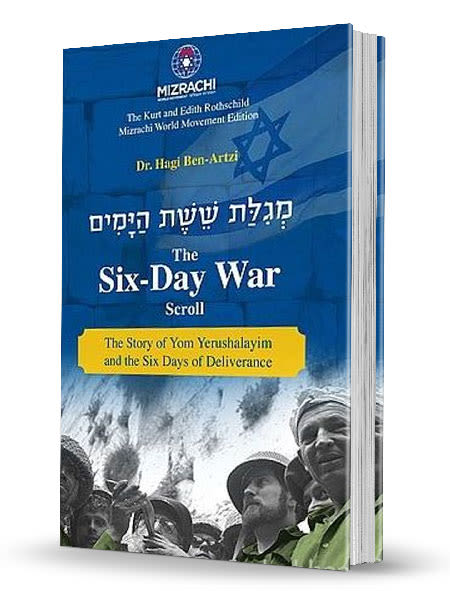
Tell us what you think!
Thank you for your comment!
It will be published after approval by the Editor.